|
|
|
Sort Order |
|
|
|
Items / Page
|
|
|
|
|
|
|
| Srl | Item |
| 1 |
ID:
112835
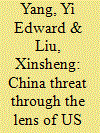

|
|
|
|
|
| Publication |
2012.
|
| Summary/Abstract |
China scholars have examined the 'China threat' theory from various theoretical perspectives, offered a range of explanations for the theory's emergence and forecast the potential implications for US-China relations. However, few scholars have empirically studied the 'China threat' theory through the lens of the US media. This is a critical oversight, because the media plays a pivotal role in shaping US public opinion and US foreign policy, and the media is a key channel for 'China threat' dissemination and popularization. This study seeks to redress this oversight by empirically examining 'China threat' coverage in the US print media over a 15-year period from 1992 to 2006. We use content-analysis methodology to systematically collect, code and analyze 'China threat' data from five major US newspapers and to track the frequency and content of this coverage over time.
Our analysis reveals many interesting patterns in 'China threat' media coverage. First, the initial emergence of 'China threat' arguments in the US print media corresponded with the sharp upward turn in China's economic growth rates in the early 1990s. However, since the early 1990s, 'China threat' coverage has not mirrored China's steady growth. Rather, the media coverage was cyclic, featuring three key peaks (1996, 2000 and 2005) followed by subsequent declining interest. Second, our analysis reveals that the focus of these stories also varied over time. Perceptions of China as a political/ideological threat dominated media coverage in the earlier years (1992-1994) but steadily declined after 1995 and totally disappeared from the US print media after 2001. Perceptions of China as a military/strategic threat replaced political/ideological concerns in 1995, and the military focus has dominated media coverage ever since. Perceptions of China as an economic/trade threat persisted steadily throughout the 15-year time period with a clear uptick in recent years. We conclude this analysis by turning to the literature on realism, agenda setting and information processing to offer possible explanations for these empirical trends.
|
|
|
|
|
|
|
|
|
|
|
|
|
|
|
|
| 2 |
ID:
178778
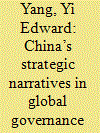

|
|
|
|
|
| Summary/Abstract |
Beijing has long sought to shape global narratives about China. The Xi Jinping administration not only continued that effort but also added an entirely new dimension: it now seeks to use discourse power, particularly through formulating and promoting strategic narratives, to reshape the international system itself. Drawing upon social identity theory (SIT) and strategic narratives framework, this study shows that Beijing employs a multifaceted narrative strategy to redefine existing norms or create new ones in varied global governance domains. A theoretical framework is presented to explain the strategy and subsequently applied to illustrate China’s strategic narratives at the international system level and in three global governance areas, i.e., climate change, human rights, and Internet governance.
|
|
|
|
|
|
|
|
|
|
|
|
|
|
|
|
| 3 |
ID:
087710


|
|
|
|
|
| Publication |
2009.
|
| Summary/Abstract |
Empirical evidence supports the poliheuristic (PH) theory of decision making, which states that leaders typically employ a two-stage non-compensatory decision-making process. In stage one leaders reject options that do not meet some minimum criteria of acceptability on one or more dimensions, and in stage two they choose among the remaining options using a more rational utility-maximizing rule. While PH theory has primarily been applied at the monadic level, to explain the process and content of states' decisions, we contend it has important implications for strategic interaction and can help to explain outcomes in world politics. Specifically, we argue that a crucial variable shaping crisis outcomes is the degree to which leaders' non compensatory decision criteria in stage one include options' acceptability to the opponent. When leaders empathize with their opponent and screen out those options the opponent considers unacceptable, crises will be resolved more quickly and with a lower likelihood of escalation. Empathy introduced during the second, utility-maximizing stage, may also dampen conflict but is less effective than stage one empathy. We illustrate this dyadic non compensatory model by examining two cases involving the U.S.-China and U.S.-Iraq bilateral relationships.
|
|
|
|
|
|
|
|
|
|
|
|
|
|
|
|
| 4 |
ID:
087730
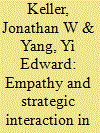

|
|
|
|
|
| Publication |
2009.
|
| Summary/Abstract |
Empirical evidence supports the poliheuristic (PH) theory of decision making, which states that leaders typically employ a two-stage non-compensatory decision-making process. In stage one leaders reject options that do not meet some minimum criteria of acceptability on one or more dimensions, and in stage two they choose among the remaining options using a more rational utility-maximizing rule. While PH theory has primarily been applied at the monadic level, to explain the process and content of states' decisions, we contend it has important implications for strategic interaction and can help to explain outcomes in world politics. Specifically, we argue that a crucial variable shaping crisis outcomes is the degree to which leaders' non compensatory decision criteria in stage one include options' acceptability to the opponent. When leaders empathize with their opponent and screen out those options the opponent considers unacceptable, crises will be resolved more quickly and with a lower likelihood of escalation. Empathy introduced during the second, utility-maximizing stage, may also dampen conflict but is less effective than stage one empathy. We illustrate this dyadic non compensatory model by examining two cases involving the U.S.-China and U.S.-Iraq bilateral relationships.
|
|
|
|
|
|
|
|
|
|
|
|
|
|
|
|
| 5 |
ID:
101611
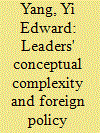

|
|
|
|
|
| Publication |
2010.
|
| Summary/Abstract |
Present research on foreign policy change (FPC) focuses on systemic-structural variables and domestic politics as key causal factors motivating states to change their foreign policy behaviour. Recent works also look towards decision context and bureaucratic politics to explain FPC. 1 In this article, I concur with Walter Carlsnaes 2 in arguing that attention should focus more on exploring the role of human agents, i.e. leaders that make actual foreign policy decisions, when explaining and predicting FPC. Specifically, I use the leadership traits analysis (LTA) framework to argue that a leader's level of conceptual complexity interacts with external stimuli (system- and/or domestic-level factors) to affect: (i) the leader's willingness to change course in response to policy failure and (ii) the type of changes that the leader is likely to carry out.
|
|
|
|
|
|
|
|
|
|
|
|
|
|
|
|
| 6 |
ID:
083749
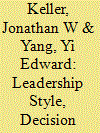

|
|
|
|
|
| Publication |
2008.
|
| Summary/Abstract |
The poliheuristic (PH) theory of decision making has made important contributions to our understanding of political decision making but remains silent about certain key aspects of the decision process. Specifically, PH theory contends that leaders screen out politically unacceptable options, but it provides no guidance on (1) the crucial threshold at which leaders reject options as politically unacceptable, (2) whether this threshold varies across leaders and situations, and, (3) if so, which factors shape variation in this threshold. We integrate PH theory with research on political leadership and decision context and derive hypotheses from this modified PH framework. An experimental test reveals that situational context and leadership style affect both (1) the ``noncompensatory threshold'' at which decision makers reject options as politically unacceptable and (2) how much decision makers rely on their constituents' views in making policy choices. We conclude that a modified PH theory incorporating these insights will have enhanced explanatory and predictive power.
|
|
|
|
|
|
|
|
|
|
|
|
|
|
|
|
|
|
|
|
|